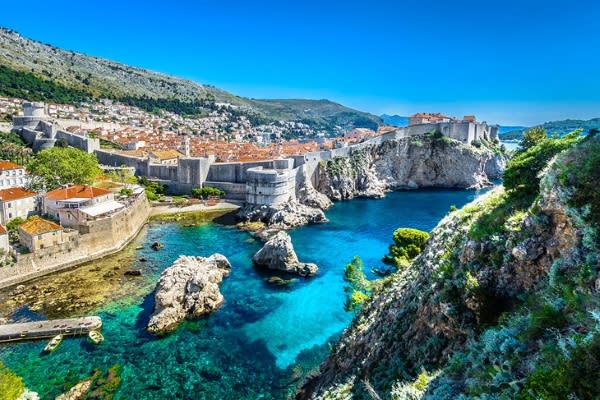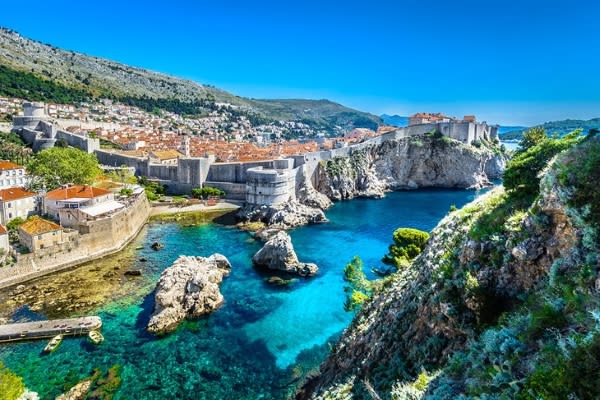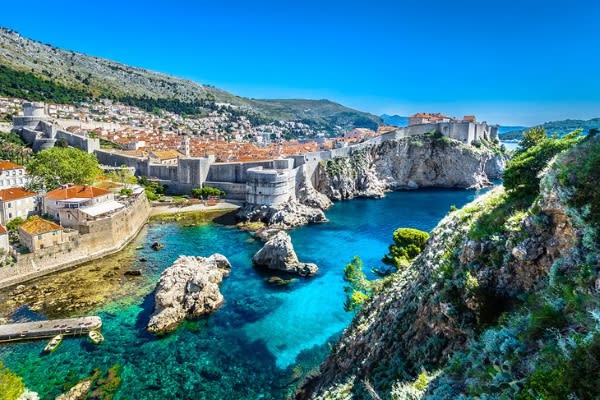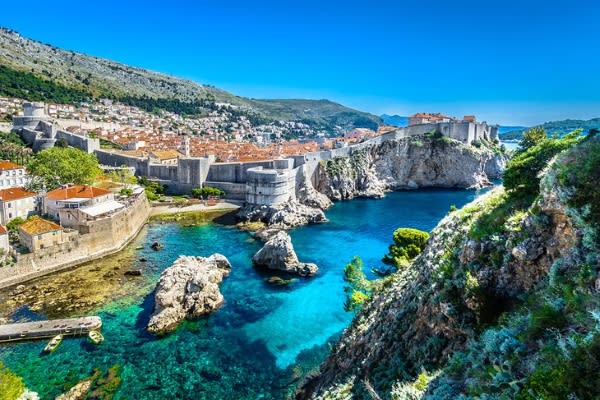Croatia
Overview and productions
Among recent productions to have shot in Croatia are German feature Momo (service production by Pakt Media), series two of UK TV show Debutante (service production by MP Films), Prime Video’s The Terminal List: Dark Wolf (service production by Embassy Films) and US indie Tidepools.
“The story we were doing was location dependent,” explains Tidepools producer and cinematographer Jonathan Hall of what drew him to the picturesque coastal town Vrbnik on the island of Krk. “We wanted a sleepy, European, water-based town, something on the ocean that could feel like a fishing village that time forgot.” The film, which stars Honor Swinton Byrne and Sam Spruell, had 4Film as its service producer. “They were great. They were willing to get their hands dirty and enable us to use every resource we possibly could,” says Hall of the Croatian outfit.
One suggestion he offers filmmakers coming to Croatia is to “plan around tourist season”. The same historic locations that have such a magnetic effect on movie producers also attract visitors, with July or August the main tourist season, meaning accommodation is more difficult and expensive to secure. “It’s like going to Hawaii. If you’re not going at the right time of year, you’re never going to get a cheap hotel room. But it’s a beautiful country,” says Hall, who was happy with the local crews (“They’re great, they all speak English”), while the incentive was efficient and easy to use.
Croatia is a signatory of the EU convention on co-productions and has treaties with, among other countries, Germany, Italy and France. There is also selective minority co-production support. International producers coming to Croatia also benefit from the help of the Croatian Audiovisual Centre’s Filming In Croatia department, which assists with crews, services, permits, equipment and more. Sixteen international projects were supported by the Filming In Croatia incentive programme in 2024; a higher figure than in 2023, although there were fewer US studio and streamer titles than in previous years.
One noticeable trend in recent years is for productions to come to Croatia simply to do post-production. Studiocanal/The Picture Company’s Control, basketball feature Dražen and season two of Netflix’s The Empress, all serviced by Poster, are examples of the trend.
“We chose Croatia for a combination of creative and financial reasons,” says Michael Gottwald, producer of Searchlight Pictures-backed O’Dessa, a post-apocalyptic music drama that premiered at SXSW in March before being released on Hulu. “The film called for a diverse landscape — a port, farmland, rolling mountains, dry plains and an urban centre in Zagreb that we could use as the foundation for our fictional city.
“While Croatia is a relatively inexpensive country compared to the United States,” he adds, “the tax incentive programme meant we could expand the scope of the film by shooting in Croatia for comparatively less money.”

Gallery
Locations and permits
Shooting at these locations can be straightforward, say producers, but requires the assistance of local production contacts. “[For The Hitman’s Wife’s Bodyguard], we closed traffic on a bridge and in various towns for action and stunt driving scenes,” says Igor A Nola of local outfit MP Film, which gave production service support to The Hitman’s Wife’s Bodyguard and McMafia. “We also closed a state road for five consecutive working days, two weeks in a row. We got huge support from local road authorities, police and community.”
Shooting in the summer, particularly in the coastal towns, can be difficult because of tourists, so most productions tend to visit between October and May. Preparation is key. Depending on the location, it is advisable to talk to local authorities, or even government officials, well in advance. For some nationalities, both shooting and work permits are required, as well as visas. Hiring the services of a local co-ordinator is recommended.
Inflation is another issue. As in many countries in the region, prices have gone up due to economic factors the film industry cannot control.

Infrastructure and crew
Croatia is famous for its spectacular locations and experienced English-speaking crews. The country can accommodate up to three productions at once without crews and facilities becoming too stretched. Leading local production companies include Light Film International, 4Film, Antitalent, Blue Sky Adriatic, Embassy Films, Drugi plan, MP Films and Pakt Media.
Croatia does not yet have any big studios and plans to build such facilities were put on hold after the pandemic. Productions tend to use Cinecro, a facility founded in 2012 that has two soundstages.

Travel and logistics
Croatia has excellent transport links thanks to its highly developed tourism industry. Zagreb is the centre of the film business, while Dubrovnik is only an hour by plane. It takes an hour or so in a car to get from Zagreb to the coast.
Croatia can be divided into three geographically distinct zones: coastal, highland and the Pannonian region, connected by modern highways, which shorten the travel times.
Zagreb Airport is the centre of air traffic, while smaller facilities on the coast (Dubrovnik, Split, Zadar, Pula, Rijeka) bring many passengers to Croatia, most of them tourists.

Size matters
Croatia is a small yet diverse country situated at the crossroads of central Europe, the Balkans and the Mediterranean. It has a long coastline, including 1,244 islands. The country can be divided into three geographically distinct zones: the coastal region, the highland region and the Pannonian lowlands region. Capital city Zagreb is the cultural, economic and political centre, and the main hub for the film and TV sector.
First contact: Tanja Ladovic Blazevic, head of Filming In Croatia filmingincroatia@havc.hr

Sign up for newsletter
Newsletter